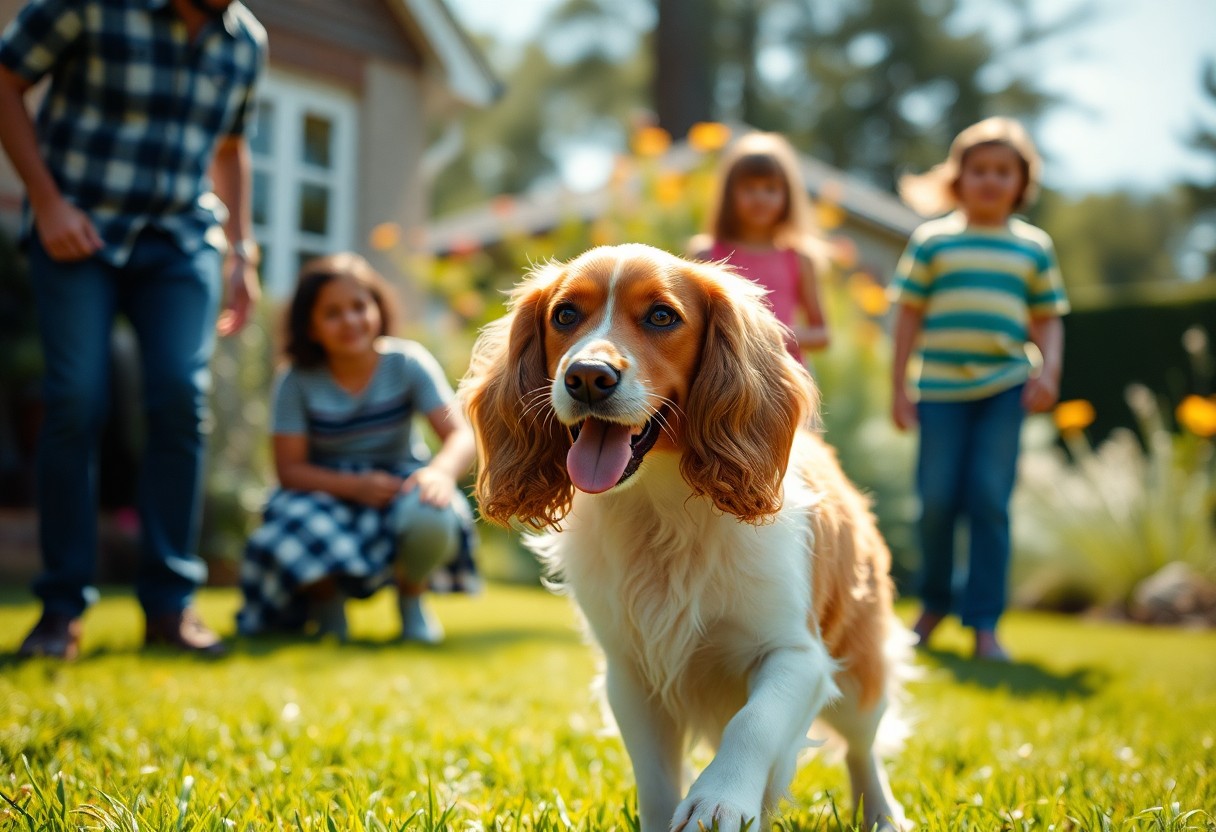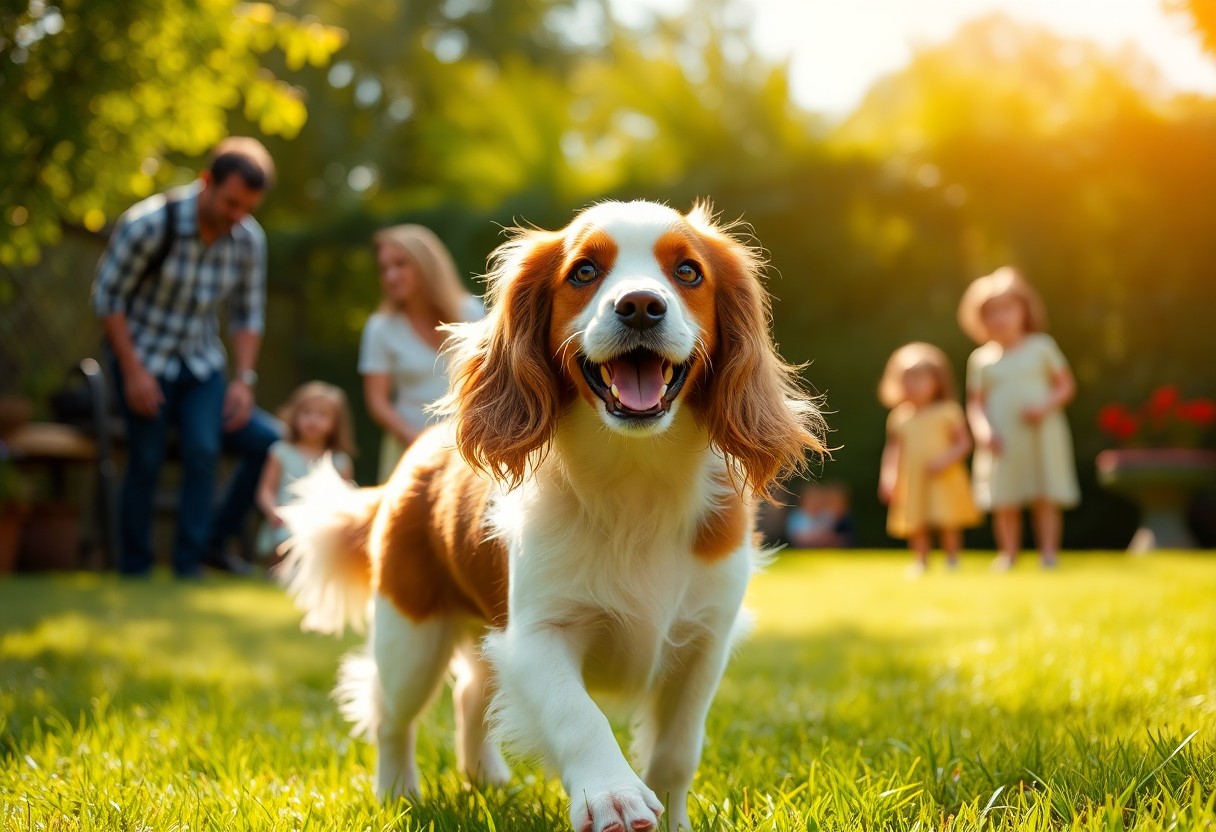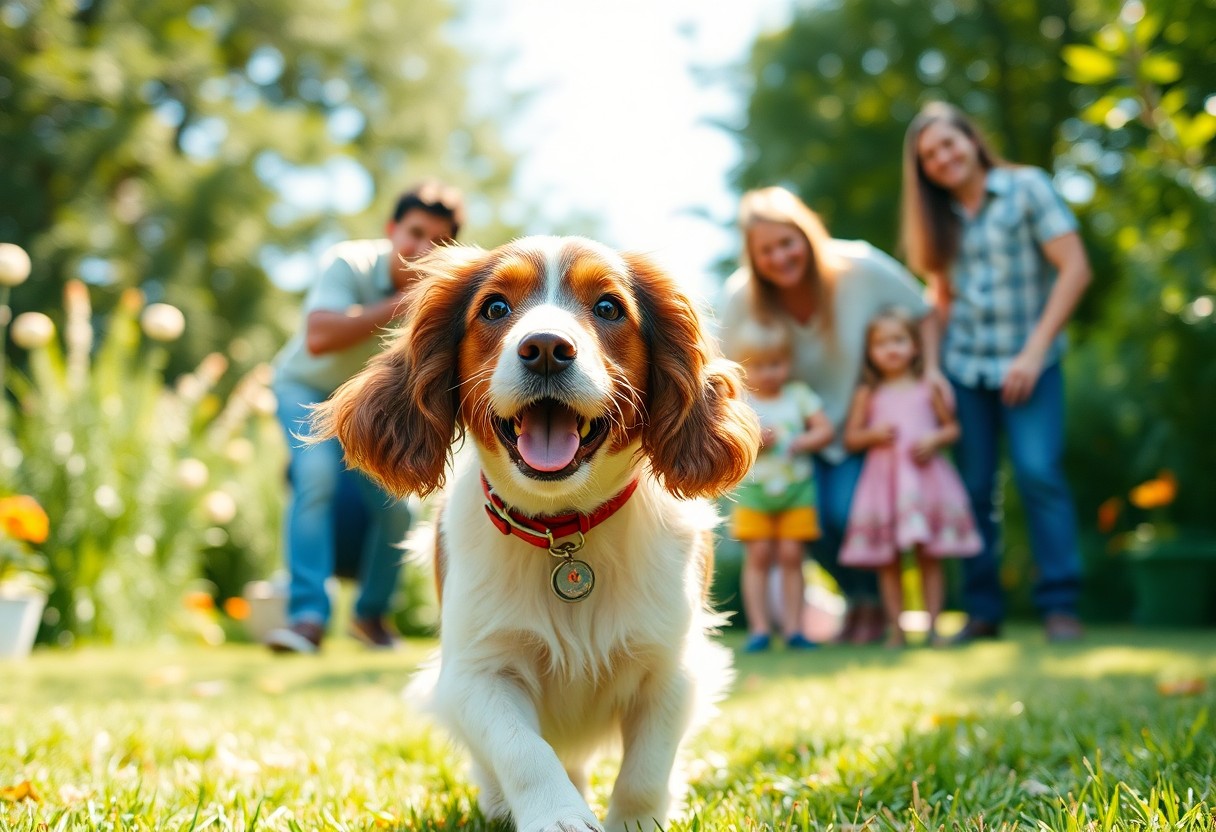Pets can bring immeasurable joy and companionship into your life, and Spaniel dogs are some of the most affectionate and loyal breeds you can choose. With their playful personalities and intelligence, they adapt seamlessly to various living situations. Spaniels thrive on human interaction and excel in training, making them a wonderful addition to your family. Whether you’re looking for an adventure buddy or a couch companion, Spaniels can fulfill both roles with enthusiasm.
Key Takeaways:
- Spaniels are known for their friendly and affectionate nature, making them excellent companions for families and individuals alike.
- They are highly trainable and eager to please, which simplifies obedience training and enhances the bond between the dog and its owner.
- Spaniels have a playful disposition, providing endless joy and entertainment both indoors and outdoors.
- Their moderate energy levels make them suitable for various living situations, from apartments to larger homes with yards.
- Spaniels are great with children and other pets, promoting a harmonious household environment.
- Regular grooming and care are manageable, allowing owners to enjoy their furry friend without excessive maintenance concerns.
- They possess a strong instinct for retrieving, making them ideal pets for active owners who enjoy outdoor activities and sports.
History of Spaniel Breeds
While the term “spaniel” originally referred to a group of dogs that emerged in the Middle Ages, these breeds have evolved over centuries. Spaniels were primarily used for hunting and retrieving game, with their gentle temperament making them well-suited for companionship. Their versatility and affectionate personality have led them to become beloved family pets in modern times.
Origin and Development
Any discussion of spaniels must start with their origins, which trace back to Spain, where they were first developed as hunting dogs. Over the years, selective breeding and environmental adaptations led to the emergence of various spaniel breeds, each tailored for specific purposes and environments. This development was further influenced by the breed’s popularity among aristocratic families in Europe.
Popular Spaniel Breeds
Across the globe, spaniel breeds such as the Cocker Spaniel, Springer Spaniel, and Cavalier King Charles Spaniel stand out for their friendliness and adaptability. These dogs excel not only in hunting and retrieving but also as cherished family companions.
The Cocker Spaniel is well-known for its loving nature, making it a favorite among families. The Springer Spaniel, with its energetic demeanor, is an excellent choice for those who enjoy an active lifestyle. Meanwhile, the Cavalier King Charles Spaniel stands out for its affectionate and gentle personality, often becoming a child’s best friend. Each of these breeds brings their own unique characteristics, ensuring that you will find the perfect fit for your lifestyle. Their distinctive traits and history make them beloved pets that enhance any home.
Temperament and Personality
Now, if you’re looking for a dog with a wonderful disposition, Spaniels are known for their friendly and playful nature. Their sociable character makes them excellent companions, and you can read more on how to Help your Cocker Spaniel to love life! | Blog. You’ll find they are adaptable and eager to please, making them a wonderful addition to any household.
Affectionate Nature
Against the stereotype of aloof dogs, Spaniels are incredibly loving and devoted pets. They thrive on human interaction and joyfully shower their families with affection. Whether snuggling on the couch or playing fetch in the yard, you’ll often find your Spaniel by your side, ready to provide endless love.
Intelligence and Trainability
About their intelligence, Spaniels rank among the most trainable dog breeds. Their innate curiosity and desire to please make them excellent learners. As you engage in consistent and positive training methods, your Spaniel will quickly master commands, tricks, and even complex tasks, enhancing your bond and ensuring a well-mannered companion.
Temperament is key to understanding your Spaniel’s nature. These dogs are not just playful; they also possess a remarkable level of intelligence. This makes them highly trainable, and with regular practice, you can teach them important commands and tricks. Their eager-to-please attitude means they respond well to positive reinforcement. However, it’s important to ensure that their mental stimulation needs are met to prevent boredom, as lack of engagement can lead to behavioral issues. In essence, Spaniels require both love and discipline for a balanced temperament.
Health and Care Requirements
Not only are spaniels known for their engaging personalities, but their health and care needs are relatively straightforward. Regular exercise is imperative to keep them happy and healthy. It’s important to schedule walks, playtime, and mental stimulation to maintain their overall well-being.
Common Health Issues
One common concern with spaniels is their predisposition to certain genetic conditions, such as hip dysplasia and ear infections. Regular veterinary check-ups are imperative to monitor their health and catch potential issues early.
Grooming and Maintenance
By keeping up with grooming and maintenance, you can ensure your spaniel remains healthy and handsome. Regularly brushing your dog’s coat encourages healthy fur and skin while preventing matting.
It’s imperative to schedule grooming sessions at least once a week to keep their coat in top condition and to minimize shedding in your home. You should also pay special attention to their ears, as spaniels are particularly prone to ear infections due to their floppy ears. Clean their ears with a vet-recommended solution to prevent wax buildup. Additionally, regular dental care, including brushing their teeth and providing dental chew treats, will help maintain their overall health and prevent dental issues. Investing time in grooming not only ensures your spaniel looks great but also strengthens your bond with them.
Activity Level and Exercise Needs
Your Spaniel is an active and energetic breed, requiring a good balance of play and structured exercise. They thrive on daily activity, which helps to keep them physically fit and mentally stimulated. Aim for at least an hour of exercise each day, blending different types of activities to keep your furry friend engaged and happy.
Daily Exercise Recommendations
Along with regular walks and playtime, consider incorporating activities like fetch or agility training, which can be enjoyable for both you and your Spaniel. Engaging in these daily exercises not only helps maintain their health but also strengthens your bond.
Ideal Living Environments
Recommendations suggest that Spaniels do well in environments where they have access to ample outdoor space. A home with a fenced yard allows them to explore and run freely, which is imperative for their well-being. Urban living can work too, as long as you commit to daily outings. Regular trips to local parks can also provide the exercise and socialization they need.
For instance, if you live in an apartment, make sure to plan frequent trips to dog parks where your Spaniel can socialize with other dogs. This interaction is vital for their mental health, as they are sociable animals that thrive on companionship. Frequent visits to open spaces not only contribute to their exercise needs but also cater to their innate desire to explore and play, keeping them happy and well-adjusted.
Compatibility with Families
For families seeking a loyal companion, spaniel dogs are an ideal choice. Their gentle nature, high energy levels, and affectionate demeanor make them perfect for households with children and other pets. Their adaptability allows them to thrive in various family environments, strengthening bonds and creating lasting memories.
Good with Children
Compatibility with spaniels and children is exceptional, as they are known for their playful temperament and patience. Their friendly demeanor encourages safe and engaging interactions, increasing the likelihood that your children will develop a meaningful relationship with your furry friend.
Interaction with Other Pets
With spaniels, socialization is a strong point. They generally show friendliness and adaptability towards other pets, making them great companions for existing furry family members. Their curious nature ensures they tend to approach new pets with an open mind, reducing territorial behavior often seen in other breeds.
For instance, when introducing a spaniel to a household with other pets, you may find that they quickly engage in play rather than display any signs of aggression. Their playful energy allows them to bond swiftly with dogs and even cats, especially when they’re properly socialized from a young age. You’ll appreciate how their loving and gentle personality helps mitigate any potential jealousy, creating a harmonious environment among your pets.
Training Tips for Spaniels
Once again, training your Spaniel requires patience and consistency. Use positive reinforcement techniques to encourage good behavior and avoid negative reinforcement. Here are a few key tips:
- Start with basic commands like sit, stay, and come.
- Use high-value treats to reward your Spaniel.
- Keep training sessions short and engaging.
- Be consistent with commands and cues.
- Always end on a positive note.
Assume that with dedication, your Spaniel will respond significantly to your training efforts.
Effective Training Techniques
Along the journey of training your Spaniel, it’s beneficial to utilize techniques such as clicker training and agility games. These methods not only help establish commands but also promote a bond between you and your dog. Make training a fun experience by incorporating play, and be sure to reward your Spaniel generously for good behavior.
Socialization Importance
Alongside training, socialization plays an important role in shaping your Spaniel into a well-adjusted pet. Introducing your dog to different people, pets, and environments helps nurture their confidence and reduces the risk of behavioral issues.
It is imperative to expose your Spaniel to a variety of situations during their early developmental stages. This exposure helps them learn how to interact calmly and positively with both unknown dogs and people, reducing the chances of anxiety or fear-based behaviors. Ensure your Spaniel experiences various environments, sounds, and social interactions to foster a balanced temperament. Ultimately, this proactive approach in socialization will contribute to your dog’s overall happiness and well-being.
Final Words
On the whole, choosing a Spaniel as your pet can enhance your life with their unmatched loyalty, playful demeanor, and affectionate nature. Their adaptability makes them suitable companions for families, singles, and seniors alike. With training and socialization, you can form a strong bond that enriches both your lives. You’ll find that their joyful energy and loving disposition contribute to a fulfilling companionship. Ultimately, Spaniels can be more than just pets; they become cherished members of your family.
FAQ
Q1: What characteristics do Spaniel dogs have that make them great companions?
A: Spaniel dogs are known for their friendly and affectionate nature. They are highly social animals that thrive on human interaction, making them ideal companions for families and individuals alike. Their playful demeanor, combined with their eagerness to please, allows them to connect deeply with their owners, providing constant companionship and emotional support.
Q2: Are Spaniel dogs suitable for families with children?
A: Yes, Spaniel dogs are generally great with children. Their gentle and loving temperament makes them perfect playmates for younger kids. They are patient and tolerant, loving to engage in games, making family life more vibrant. It’s always advisable to supervise interactions between dogs and young children, but Spaniels often adapt well to a bustling household environment.
Q3: Do Spaniel dogs require a lot of exercise?
A: Spaniel dogs do have moderate exercise needs. They enjoy daily walks, playtime, and mental stimulation through activities such as fetch or agility training. Regular exercise helps maintain their health and ensures they stay balanced and happy. Owners should strive for at least one hour of exercise per day, which can be split into sessions for optimal engagement.
Q4: How do Spaniel dogs get along with other pets?
A: Typically, Spaniel dogs are sociable and often get along well with other pets, including dogs and cats. Their playful and friendly nature allows them to coexist in a multi-pet household. Early socialization and gradual introductions can help foster harmonious relationships, ensuring all pets feel comfortable and secure in their environment.
Q5: Are Spaniel dogs easy to train?
A: Yes, Spaniel dogs are relatively easy to train because of their intelligent and eager-to-please disposition. They respond well to positive reinforcement techniques, such as praise and treats. Consistent and patient training sessions can help them learn commands and tricks quickly, making the bonding experience between dog and owner enjoyable and rewarding.
Q6: What grooming needs do Spaniels have?
A: Spaniel dogs require regular grooming to maintain their coats and prevent matting. Depending on the specific breed, they may need to be brushed several times a week or taken to a professional groomer. Routine grooming not only keeps their coat healthy but also provides an opportunity for bonding and checking for any skin issues or parasites.
Q7: Why are Spaniel dogs often described as the perfect emotional support animals?
A: Spaniel dogs are frequently characterized as ideal emotional support animals due to their high sensitivity to human emotions. They possess an innate ability to sense when their owners are feeling down or stressed, providing comfort through their affectionate and playful nature. Their loyalty and companionship can be incredibly therapeutic, improving the overall emotional well-being of their owners.


